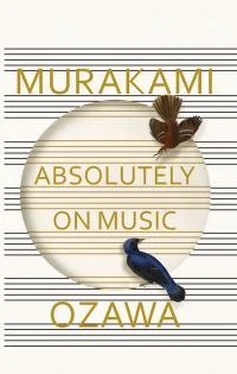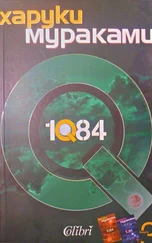MURAKAMI: Listening to your list of selections, it seems to overlap almost perfectly with the repertoire you were taught by Professor Saito back when you were a student.
OZAWA: Hmm, that’s true. Every piece I’ve just mentioned was something that Professor Saito taught me back then. Even Verklärte Nacht. I definitely want to play that next year. My health just wasn’t up to it this year, unfortunately. He also taught me Dvořák’s Serenade for Strings. I’d like to do that sometime, too. And Hugo Wolf has an all-string piece, Italian Serenade.
MURAKAMI: I don’t know that one.
OZAWA: Most professional musicians don’t know it, either. It’s a beautiful piece, though.
MURAKAMI: I think Rossini had some all-string piece.
OZAWA: Yes. Professor Saito used to teach one. It’s pretty light, though, maybe too light.
MURAKAMI: It sounds to me as though you are taking what Professor Saito taught you when you were young and passing it on to the next generation in your own way.
OZAWA: That’s true, now that you mention it. Professor Saito put a lot of emphasis on both the Bartók and the Tchaikovsky Serenade for Strings.
MURAKAMI: But the Toho Gakuen orchestra was not all strings, was it? You had a few wind instruments, too.
OZAWA: Yes, at times there were some. But we did way more all-string pieces than anything else because there was hardly anyone playing wind. I remember doing Rossini’s overture to The Barber of Seville with exactly one oboe and one flute. We had to do a whole new arrangement, and what a job that was! We had the viola playing some of the woodwind notes.
MURAKAMI: Talk about making do! Which reminds me, yesterday’s Tchaikovsky was a marvelous performance, but I felt there would have been a stronger bass sound if you had had one or two more double basses playing. The one double bass sounded a little lonely by itself.
OZAWA: Well, that’s the way Tchaikovsky had it in the original score.
MURAKAMI: Still, listening to the concert, I felt it would have been a perfectly adequate performance for an established professional orchestra. It had an urgency beyond anything you might expect from a “student orchestra.”
OZAWA: It’s true, you could take a performance like last night’s anywhere in the world. If you increased their repertory, there are several musicians in that group who could handle a solo well enough to perform a concerto, and the orchestra would work in Vienna or Berlin or New York. You could perform there without the least embarrassment.
MURAKAMI: The overall level is so high, after all. You know the expression “not a hair out of place.” Well, there really wasn’t one.
OZAWA: No, there’s not one second-rate musician in that group. This year, everybody is terrific. It’s no accident, though. The more we work on the group, the better they get. Each year, the auditions have become more demanding, and the teaching has become more thorough.
MURAKAMI: To tell you the truth, the first time I heard them playing—I think it was the second day of rehearsals—I had some real doubts about what they could accomplish. The Ravel didn’t sound like Ravel, and the Schubert didn’t sound like Schubert. I never imagined they would come this far in a little over a week.
OZAWA: Well, they were still getting to know each other at that point.
MURAKAMI: The main thing I felt then was that they sounded so young ! The forte passages were messy, and the piano passages shaky. But as I listened to each day’s rehearsals, the forte started coming together, and the piano sections developed into clear, even lines of music. I was impressed! So that’s how musicians get good.
OZAWA: Every once in a while, we get a few students who play their instruments extremely well and produce truly beautiful, natural sound, but who don’t yet really understand what music is. They have talent but no depth. They don’t think about anyone but themselves. When the teachers encounter students like that at their auditions, they have trouble making up their minds. Should they admit these students? Wouldn’t they just disrupt the others’ harmony? As far as I’m concerned, though, that is the very kind of person we want to admit. If the sound is that natural and wonderful, you should bring the student in and really drill the music into them. If you do that—and if everything goes well—a person like that can become a marvelous performer. There aren’t that many born musicians who can produce such a natural and beautiful sound.
MURAKAMI: You mean, you can’t teach that innate talent, but you can teach someone how to approach music and how to think about it.
OZAWA: Exactly.
MURAKAMI: Among the student quartets I heard, the one that played the Janáček was the best—really wonderful. I had never heard that piece before.
OZAWA: Yes, that was terrific, really wonderful. The first violinist in that quartet, Sasha, was the one who begged to play the Janáček. Usually it’s the teacher who assigns the work, but this time the request came from the student.
MURAKAMI: With a little more cooking, that group would be good enough to appear as a professional string quartet, wouldn’t you say?
OZAWA: Yes, they could maybe make a living at it even now. But the students we get all want to be soloists.
MURAKAMI: There aren’t that many young musicians who want to play chamber music, are there?
OZAWA: No, maybe not. There are hardly any people who say they want to work this hard on chamber music. But still, if they do study chamber music as closely as they do here, they’re going to last longer as musicians. At least I think that’s true.
MURAKAMI: Robert Mann has concentrated on chamber music for his entire career, hasn’t he? Don’t you think it’s a matter of personality? I mean, there are some people who want to do chamber music and others who are only interested in becoming soloists. Or is it just that you can’t make a living doing only chamber music?
OZAWA: That may be part of it. So everybody aims to become a soloist, and if that doesn’t work out, they can always join an orchestra.
MURAKAMI: And after they do join an orchestra, there’s a tradition of forming quartets with their colleagues and becoming active in chamber music that way. The Vienna Philharmonic, the Berlin Philharmonic …
OZAWA: True, true. Their orchestra work gives them a regular income, and they perform chamber music in their spare time—music for themselves. No, it’s not easy to make a living with chamber music.
MURAKAMI: And isn’t the audience for it rather limited?
OZAWA: Maybe so. People who love chamber music really love it, but there probably aren’t that many of them. I do hear that their numbers are increasing these days, though.
MURAKAMI: In Tokyo, there’s been a gradual increase in the number of small halls suited for chamber music—places like Kioi Hall or Casals Hall, though that one’s gone now.
OZAWA: True, there weren’t many places like that in the old days. They used to perform chamber music in the old Mitsukoshi Theater—Professor Saito, or the violinist Mari Iwamoto. And there was Dai-ichi Seimei Hall.
MURAKAMI: Why does the Ozawa Academy concentrate so heavily on string quartets?
OZAWA: Well, this year’s program doesn’t have any quartets by Mozart or (among more modern composers) Bartók or Shostakovich—but all the great composers, from Haydn to the present day, have written string quartets. Mozart, Beethoven, Schubert, Brahms, Tchaikovsky, Debussy—all of them have put tremendous energy into their quartets, so by performing the string quartets they wrote, you’re able to gain a deeper understanding of those composers. Especially Beethoven: you can’t really understand him unless you know his late quartets. So for that reason, we put a lot of emphasis on the string quartet. It’s one of the foundations of music.
Читать дальше











